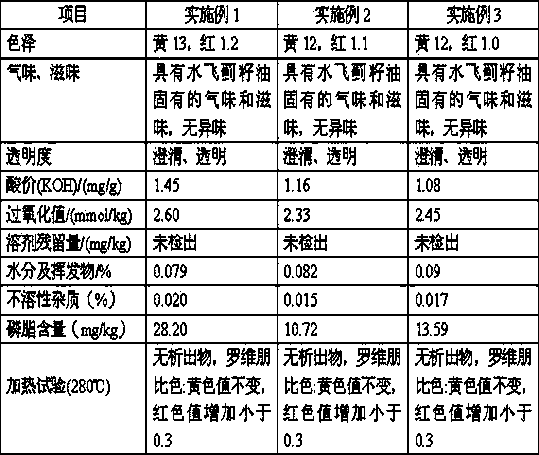Method for refining silybum marianum seed oil by enzymic-method degumming
A technology for refining water and milk thistle, which is applied in the direction of fat oil/fat refining and fat production. It can solve the problems of oil emulsification and phospholipid separation difficulties, and achieve the effects of avoiding high-temperature vacuum decolorization, low oil loss, and strong adsorption capacity.
- Summary
- Abstract
- Description
- Claims
- Application Information
AI Technical Summary
Problems solved by technology
Method used
Image
Examples
Embodiment 1
[0029] Place the container containing silymarin seed crude oil in a drying oven at 50°C. When the temperature of the sample reaches 50°C, keep it for 1 hour to separate the impurities from the oil, and remove the impurities by suction filtration. Take 100g crude oil, heat it in a water bath to 70-80°C, add 45% (w / v) citric acid solution at the same temperature according to the dosage ratio of 0.12mL / 100g crude oil, and maintain it for 20-30min under mechanical stirring at 500r / min. Lower the temperature of the crude oil to 50-55°C, and add 4% (w / v) NaOH solution to adjust the pH to 5-5.3. Add phospholipase according to the addition amount of 80mg / kg crude oil, keep warm for 4 hours, separate and remove peptized impurities, and obtain degummed oil;
[0030] Heat the degummed oil obtained above in a water bath to the set initial temperature of alkali refining (40°C), add a calculated amount of NaOH solution (concentration 10% (w / v)) under stirring conditions, and the total amoun...
Embodiment 2
[0034] Place the container containing silymarin seed crude oil in a drying oven at 50°C. When the temperature of the sample reaches 50°C, keep it for 1 hour to separate the impurities from the oil, and remove the impurities by suction filtration. Take 100g crude oil, heat it in a water bath to 70-80°C, add 45% (w / v) citric acid solution at the same temperature according to the dosage ratio of 0.12mL / 100g crude oil, and maintain it for 20-30min under mechanical stirring at 500r / min. Lower the temperature of the crude oil to 50-55°C, and add 4% (w / v) NaOH solution to adjust the pH to 5-5.3. Add phospholipase according to the addition amount of 120mg / kg crude oil, keep warm for 8 hours, separate and remove peptized impurities, and obtain degummed oil;
[0035] Heat the degummed oil obtained above in a water bath to the set initial temperature of alkali refining (40°C), add a calculated amount of NaOH solution (concentration 12% (w / v)) under stirring conditions, and the total amou...
Embodiment 3
[0039] Place the container containing the crude milk thistle seed oil in a drying oven at 50°C, and keep it for 1h after the sample temperature reaches 50°C. Separation of impurities and grease, suction filtration. Take 100g crude oil, heat it in a water bath to 70-80°C, add 45% (w / v) citric acid solution at the same temperature according to the dosage ratio of 0.12mL / 100g crude oil, and maintain it for 20-30min under mechanical stirring at 500r / min. Lower the temperature of the crude oil to 50-55°C, and add 4% (w / v) NaOH solution to adjust the pH to 5-5.3. Add phospholipase according to the addition amount of 100 mg / kg crude oil, keep warm for 6 hours, separate and remove peptized impurities, and obtain degummed oil;
[0040] Heat the degummed oil obtained above in a water bath to the set initial temperature of alkali refining (40°C), add a calculated amount of NaOH (alkali concentration 13% (w / v)) under stirring conditions, and the total amount of lye is the theoretical alk...
PUM
| Property | Measurement | Unit |
|---|---|---|
| diameter | aaaaa | aaaaa |
Abstract
Description
Claims
Application Information
 Login to View More
Login to View More - R&D
- Intellectual Property
- Life Sciences
- Materials
- Tech Scout
- Unparalleled Data Quality
- Higher Quality Content
- 60% Fewer Hallucinations
Browse by: Latest US Patents, China's latest patents, Technical Efficacy Thesaurus, Application Domain, Technology Topic, Popular Technical Reports.
© 2025 PatSnap. All rights reserved.Legal|Privacy policy|Modern Slavery Act Transparency Statement|Sitemap|About US| Contact US: help@patsnap.com

